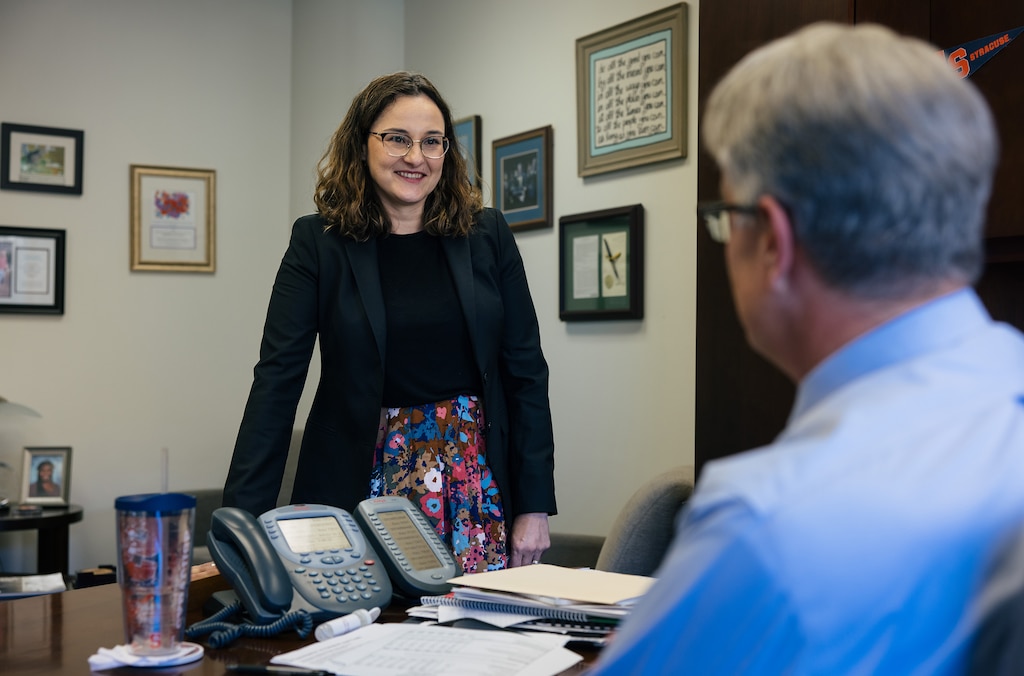“Heartbreaking.”
That’s how the woman charged with countering climate change in Montgomery County described the potential cut of tens of millions of federal dollars designated for a slew of county environmental programs.
Climate Change Officer Sarah Kogel-Smucker, who has held the job for two years, fears that the loss of the money — at least $40 million in grants — would make it harder to protect the county’s environment.
“It’s heartbreaking because we know what we need to do to solve climate change,” Kogel-Smucker said. “The technology is there, the ability is there, and it improves people’s lives when you put these solutions in place.”
The money at risk — federal grants for climate change initiatives awarded to Montgomery County under the Biden administration — is now potentially on the chopping block, Kogel-Smucker said, pointing to similar grants canceled by federal officials in other jurisdictions.
Montgomery County received the grants through Biden’s 2022 Inflation Reduction Act and the previous year’s Infrastructure Investment and Jobs Act to the tune of more than $78 million. The majority of that funding — the $40 million — is what’s in peril, Kogel-Smucker said. The county has a total climate budget of nearly $367 million, she said.
Read More
The potential loss of these grants is happening against the backdrop of deep federal cuts to agencies that support climate science. The Trump administration has slashed staffing and research at the National Oceanic and Atmospheric Administration and has shrunk the payroll at the National Weather Service. Still, she said, the county continues to move forward with its 2021 Climate Action Plan.
The initiative provides a road map for 86 actions to reduce greenhouse gas emissions by 80% by 2027 and 100% by 2035.
The Banner sat down with Kogel-Smucker recently to find out more about how she intends to protect the county from climate change as the federal government deprioritizes the issue. This interview was edited for length and clarity.
How imperiled are the county’s climate initiatives with Donald Trump in the White House?
Kogel-Smucker: We have a Climate Action Plan. We know what we need to do. We have community-wide support. We have political leadership under County Executive [Marc] Elrich and the County Council. We have support from residents. Then we had a federal administration that wanted to fund these solutions at the local level. The ball had started rolling, and so to see the ball just lose that federal momentum is heartbreaking. It doesn’t mean we’re going to stop. It doesn’t mean we can’t keep doing what we’re going to do.

What’s the county’s game plan?
One really bright spot is that the state has stepped up and released a recent energy funding opportunity for local governments for $64 million, when typically funding for these programs would be like $2 million. So the state understands the moment we’re in and wants to be a partner and is making funding available.
But the state’s in tight fiscal times, too. So we’re incredibly grateful that the state is stepping up and is being a strong partner. It doesn’t mean that we’re going to have the funding to do everything that we are able to do at the pace we would like to do it.
How is the county responding to the deep cuts at the National Oceanic and Atmospheric Administration and the National Weather Service?
We are stepping up by taking control of [some of their work] and investing in mesonet stations [weather stations that measure both air and soil conditions]. It can give you advance warnings on flooding so that we have more accurate, reliable, local information.
[The county has one in Colesville and is building three more — in Germantown, Laytonsville and a yet-to-be-determined location.]
What other climate change initiatives are underway?
As buses need to be replaced, we are replacing them with clean, electric buses one by one. But eventually you’ll have to replace all the buses on the fleet. By 2035, all county buses will be zero-emission buses.
How are you thinking about your job differently now?
Local climate action is always important but is all the more important when you’re facing federal headwinds, because we hope to be a model that other localities can replicate. We’re willing to go first and innovate and then hopefully other communities can follow.
We hope to do our part to be leaders in this area and be models for climate solutions that work at the local level, that serve our community, that benefit our residents and that address injustices — environmental injustices.





Comments
Welcome to The Banner's subscriber-only commenting community. Please review our community guidelines.